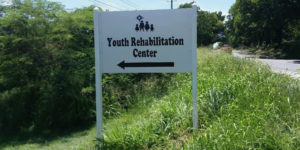
Members of the Virgin Islands State Advisory Group for Juvenile Justice and Delinquency Prevention are getting down to business, charting a path to improving the territory’s juvenile justice system with an emphasis on policy development and the revival of youth programs in the Virgin Islands.
“The chickens have come home to roost,” said SAG board Chair Riise Richards, a long-term advocate for youth programs and a five-year member of the board.
Richards said a lack of activities has contributed to the present situation with the youth.
“We have not invested enough in them,” Richards said. “Traditional youth programs have been diminished, eliminated or suspended.”
Richards said one of the SAG board’s mandates is to identify grant proposals to revive these much-needed programs and help fund others to meet the needs of young people.
The board is still looking for a few good men and women. Needed is at least one member from St. John, a few members under 28 years old who were in the juvenile justice system at one time and adults with a family member who was or is part of the juvenile system.
In the Virgin Islands, the Law Enforcement Planning Commission is the lead agency for the Federal Office of Juvenile Justice and Delinquency Prevention. The SAG board is comprised of 16 members who were newly appointed or reappointed by Gov. Albert Bryan Jr. to serve four-year terms.
At a board meeting on Feb. 26 in the Nisky Center on St. Thomas, members came together for a combined virtual and in-person training conducted by the Center for Coordinating Assistance to States and Territories.
In his opening remarks, Law Enforcement Planning Committee Director Ray Martinez welcomed the group and offered his three most important objectives.
“The juvenile justice system [in the Virgin Islands] is in desperate need of reform,” Martinez said. Identifying the board members as “carefully chosen,” Martinez said he looks forward to the board accomplishing three things: utilizing the federal funds in a way that will positively impact the territory’s youth; ensuring compliance with the core responsibilities of the federal Juvenile Justice and Delinquency Prevention Act; and diligently providing recommendations to improve the local juvenile justice system.
The board is mandated by federal law to set program goals, assist with guiding policy and award federal funds received through the Juvenile Justice and Delinquency Prevention Act. According to Richards, the board is the “nucleus of all juvenile justice programs and activities in the territory,” and advises the governor on juvenile justice matters.
At the training board, members accepted the responsibility to move forward the goals of their assigned committees. Those committees include compliance monitoring, racial and ethnic disparities, restorative justice program and legislation, grant awards, training and conferences, outreach to communities and schools and creating the Virgin Islands’ three-year plan.
The main function of the board is to ensure the territory remains in compliance with Juvenile Justice and Delinquency Prevention Act’s four core principles:
– Deinstitutionalization of Status Offenders: Rehabilitating status offenders in places other than locked facilities, such as group homes, alternative schools and through programs in their own communities.
– Adult Jail and Lock-up Removal: Focuses on removing youth from adult jails and detention facilities.
– Sight and Sound Separation: Ensures that minors are not detained in any location or confined in any institution where they may have contact with adult inmates.
– Racial and Ethnic Disparities: Focuses on addressing and reducing racial and ethnic disparities.
The group is moving forward with involving the youth and providing them with various outlets for positive connections to the community. Board members are in the initial stages of organizing a youth council, Richards said. She also wants to engage the board in creating and conducting surveys to identify and measure community needs. The data collected will provide the science and measurable outcomes needed to write grant proposals.
“The youth are hurting and suffering in silence, we must allow their voices to be heard.”
Anyone interested can volunteer to be a SAG board member by contacting Juvenile Justice Specialist Jacqueline Freeman at jacqueline.freeman@lepc.vi.gov or 340-774-6400.
Editor’s note: Melody Rames, the author of this story, is a member of the executive committee of the State Advisory Group.





